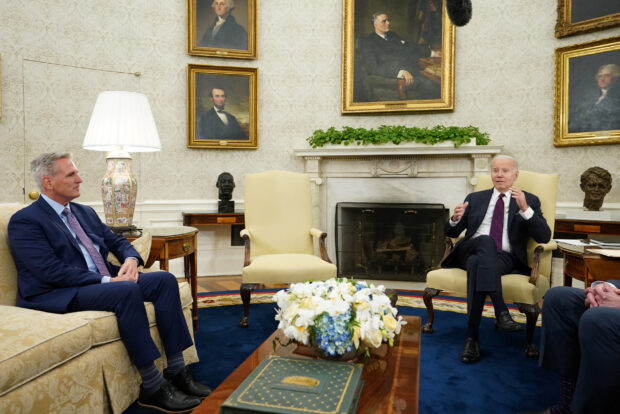Biden, McCarthy divided over debt ceiling but talks continue

U.S. President Joe Biden hosts debt limit talks with House Speaker Kevin McCarthy (R-CA) in the Oval Office at the White House in Washington, U.S., May 9, 2023. REUTERS/Kevin Lamarque
WASHINGTON – President Joe Biden and top lawmakers agreed on Tuesday to further talks aimed at breaking a deadlock over raising the $31.4-trillion U.S. debt limit, with just three weeks before the country may be forced into an unprecedented default.
After about an hour of talks in the Oval Office, Biden, a Democrat, and House of Representatives Speaker Kevin McCarthy, a Republican, committed their aides to daily discussions about areas of possible agreement as a default looms as soon as June 1.
Biden, McCarthy and the three other top congressional leaders were set to meet again on Friday.
Biden called the talks “productive” and appeared to offer Republicans some possible compromises, including taking a “hard look” for the first time at clawing back unspent coronavirus relief funds to reduce government spending.
But he repeated that Republicans must take the threat of default off the table. And he did not rule out eventually invoking the 14th amendment to the U.S. Constitution, an untested approach that would seek to declare the debt limit unconstitutional. Doing so would require litigation, he said, but is an option he may study in the future.
“There’s a lot of politics and posturing, and that’s going to continue for a while,” Biden said, but political leaders are “getting to work.”
“Everyone in the meeting understood the risk of default,” Biden said.
McCarthy emphasized a lack of progress after the meeting. “I didn’t see any new movement,” McCarthy told reporters, complaining that Biden didn’t agree to talks until time was running out. “That’s not a way to govern,” he said.
But he did say Biden indicated that he was open to discussing reforms to the permitting process for new energy projects as part of the talks.
Economists warn that a lengthy default could send the American economy into a deep recession with soaring unemployment while destabilizing a global financial system built on U.S. bonds. Investors are bracing for impact.
https://business.inquirer.net/399405/how-a-us-debt-crisis-standoff-could-cause-a-recession-a-bad-one
Biden is calling on lawmakers to raise the federal government’s self-imposed borrowing limit without conditions. McCarthy, whose party has a slim majority in the House, has said his chamber will not approve any deal that doesn’t dramatically cut spending to address a growing budget deficit and signaled that he doesn’t see a short-term fix.
Past debt ceiling fights have typically ended with a hastily arranged agreement in the final hours of negotiations, thus avoiding a default. In 2011, the scramble prompted a historic downgrade of the country’s top-notch credit rating. Veterans of that battle warn the current situation is riskier because political divides have widened.
Tuesday’s meeting was the first between Biden and McCarthy since Feb 1. It was closely watched ahead of what is expected to be a fraught period in Washington with the approach of June, when the U.S. Treasury predicts the country could be forced to default on some debts.
Earlier Tuesday, McCarthy appeared to close the door to a short-term solution that’s been widely discussed on Capitol Hill: lifting the debt ceiling through September to allow more time for agreement. Biden specifically said after the meeting that he was not ruling out such a short-term arrangement.
Investors watch closely
Neil Bradley, top policy official at the U.S. Chamber of Commerce, the nation’s largest business association, said it was positive that the two sides would continue meeting. “But we cannot stress enough that time is short, with each passing day increasing the risk for a misstep resulting in a default.”
Few countries in the world have debt ceiling laws, and Washington’s periodic lifting of the borrowing limit merely allows it to pay for spending Congress has already authorized.
Biden would agree to a separate discussion on the budget but not tied to the debt ceiling, the White House said.
The start of active talks could nonetheless soothe the nerves of investors who last week forced the federal government to pay its highest interest ever for a one-month debt issue.
Prices for short-term Treasury bills fell on Tuesday as investors sold off debt that could come due around the time the U.S. debt limit could be hit.
Biden’s foreign travel plans and House and Senate recesses mean there are just seven days when all three parties are scheduled to be in town before June 1.
Treasury Secretary Janet Yellen on Monday said a failure to raise the debt limit would hurt the U.S. economy and weaken the dollar as the world’s reserve currency. Treasury cash is dwindling as the extraordinary measures it is taking are exhausted.
RELATED STORIES:
https://business.inquirer.net/399991/yellen-says-no-good-options-if-congress-fails-to-raise-debt-ceiling
https://business.inquirer.net/400090/us-debt-limit-default-could-hit-in-early-june-to-early-august-think-tank